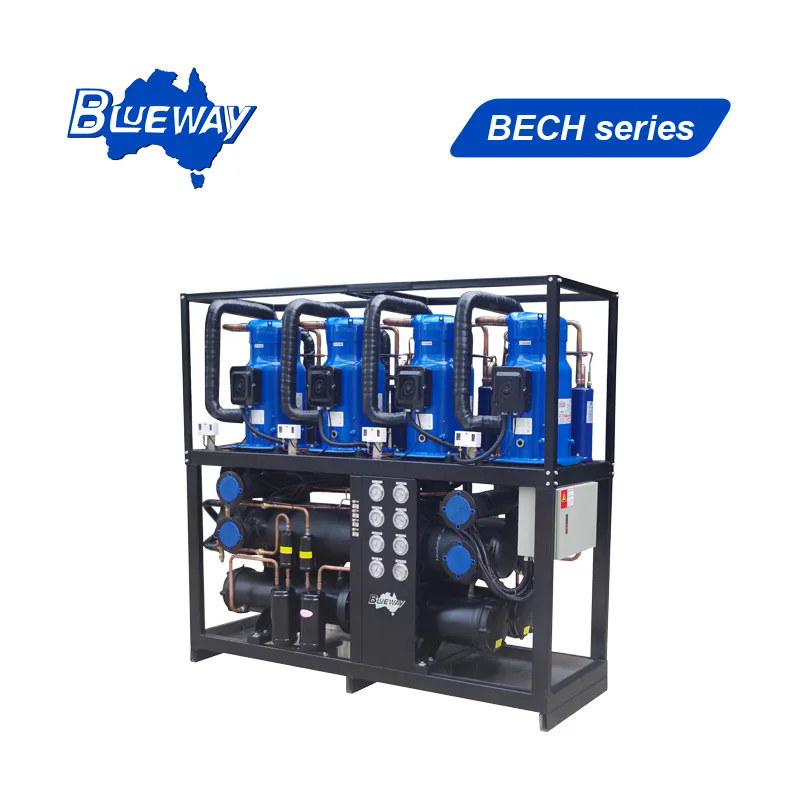Evaporative Condensing Chillers: The Future of Efficient Cooling
2024-10-09
As industries strive to meet the growing demand for energy-efficient and sustainable cooling systems, evaporative condensing chillers are emerging as a preferred solution. These chillers use the principles of evaporation to provide highly efficient cooling, offering significant energy savings and reducing environmental impact. In this blog, we’ll explore the workings of evaporative condensing chillers, their benefits, and why they are becoming a key choice for industries seeking optimal performance and sustainability.
What is an Evaporative Condensing Chiller?
An evaporative condensing chiller is a cooling system that integrates evaporative cooling principles with conventional chiller technology. Instead of using air or water alone to cool the refrigerant, these chillers use the evaporative cooling process to lower the temperature of the refrigerant more efficiently.
In a typical evaporative condensing chiller, water is sprayed over a coil where the refrigerant is circulating. As the water evaporates, it absorbs heat from the refrigerant, significantly reducing its temperature. This process improves the efficiency of the refrigeration cycle, allowing the chiller to achieve the same cooling effect while using less energy compared to traditional air-cooled or water-cooled systems.
Key Benefits of Evaporative Condensing Chillers
1. Superior Energy Efficiency
One of the most significant advantages of evaporative condensing chillers is their energy efficiency. The evaporative cooling process allows these chillers to achieve lower condensing temperatures, reducing the work that the compressor has to do. This results in lower energy consumption, often translating to energy savings of 15% to 35% compared to traditional air-cooled chillers. For industries that require continuous or large-scale cooling, these energy savings can lead to substantial cost reductions over time.
2. Smaller Footprint
Evaporative condensing chillers are designed to be compact, often requiring less physical space compared to other chiller systems. This is because the evaporative process is highly efficient at heat rejection, meaning less equipment is needed to achieve the desired cooling capacity. This smaller footprint makes these chillers ideal for facilities with limited space or for installations in urban environments where real estate is at a premium.
3. Lower Operating Costs
Because evaporative condensing chillers operate at lower condensing temperatures and require less energy to run, they also result in lower operating costs. This is particularly beneficial for industries where cooling systems need to run 24/7, such as in data centers, manufacturing plants, and hospitals. Over time, the reduction in electricity usage and maintenance needs can significantly lower the total cost of ownership for these systems.
4. Improved Environmental Sustainability
With the increasing focus on sustainability and reducing carbon footprints, evaporative condensing chillers stand out as an environmentally friendly option. Their energy-efficient operation helps reduce greenhouse gas emissions, while their use of less water compared to traditional water-cooled systems makes them more sustainable in areas where water resources are limited. Additionally, many modern evaporative condensing chillers are designed to use low-global warming potential (GWP) refrigerants, further reducing their environmental impact.
5. Quiet Operation
Compared to air-cooled chillers, which rely heavily on fans for cooling, evaporative condensing chillers operate more quietly. This is because they utilize the evaporative process rather than forced air to reject heat. This quieter operation makes them well-suited for applications in noise-sensitive environments such as residential areas, office buildings, and schools.
6. Extended Lifespan
The efficient heat rejection process in evaporative condensing chillers leads to lower stress on system components such as the compressor and fans. As a result, these chillers often experience less wear and tear, leading to longer system lifespans and reduced maintenance costs. Their ability to operate under less strenuous conditions ensures that businesses can enjoy a more reliable and long-lasting cooling solution.
Common Applications of Evaporative Condensing Chillers
Evaporative condensing chillers are versatile and can be used in a wide range of industries and applications, including:
1. Commercial HVAC Systems
Evaporative condensing chillers are commonly used in HVAC systems for large commercial buildings such as hotels, shopping malls, office complexes, and hospitals. Their high efficiency helps reduce energy consumption in these facilities, making them an ideal choice for climate control in high-occupancy environments.
2. Industrial Process Cooling
In industries where precise temperature control is critical for manufacturing processes, such as pharmaceuticals, chemical production, and food and beverage processing, evaporative condensing chillers play a vital role. These chillers provide consistent cooling performance, ensuring that industrial processes remain stable and productive.
3. Data Centers and IT Cooling
Data centers require continuous, reliable cooling to prevent overheating of servers and other critical equipment. Evaporative condensing chillers offer an energy-efficient cooling solution for data centers, helping to maintain the required low temperatures while minimizing energy use.
4. Cold Storage and Refrigeration
For cold storage facilities and refrigeration systems, maintaining optimal temperatures is crucial for preserving perishable goods such as food, pharmaceuticals, and agricultural products. Evaporative condensing chillers ensure consistent temperature control while helping to reduce operating costs in these energy-intensive environments.
5. Power Generation and Energy Plants
In power generation facilities, where large amounts of heat are produced, evaporative condensing chillers can be used to cool systems and processes. Their efficiency helps reduce the energy needed for cooling, which can improve the overall efficiency of the power plant.
Choosing the Right Evaporative Condensing Chiller
When selecting an evaporative condensing chiller for your facility, it’s important to consider the following factors:
- Cooling Capacity: Make sure the chiller is appropriately sized to handle the heat load of your specific application. An undersized chiller will struggle to keep up with demand, while an oversized unit may waste energy.
- Water Availability: Although evaporative condensing chillers use less water than traditional water-cooled systems, they still require some water for the evaporation process. Ensure that your facility has adequate water resources.
- Environmental Conditions: Evaporative condensing chillers perform best in environments with low to moderate humidity. In highly humid areas, the evaporative process may be less effective, and other cooling solutions may need to be considered.
- Energy Efficiency Ratings: Look for chillers with high efficiency ratings, such as those certified by organizations like ENERGY STAR, to ensure optimal performance and energy savings.
Conclusion
Evaporative condensing chillers represent a cutting-edge approach to cooling that delivers outstanding energy efficiency, lower operating costs, and improved sustainability. As businesses and industries continue to prioritize energy savings and environmental responsibility, evaporative condensing chillers are becoming an increasingly popular choice.
Whether you're managing a commercial building, a data center, or an industrial facility, evaporative condensing chillers offer a smart, long-term cooling solution that balances performance and sustainability. By harnessing the power of evaporation, these chillers help businesses reduce their energy consumption, lower their environmental footprint, and save on operational costs—making them a true game-changer in the world of cooling technology.



